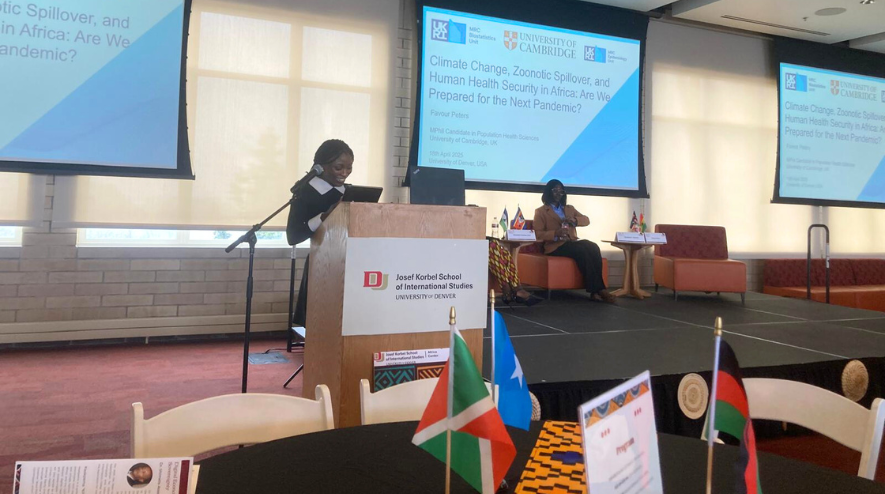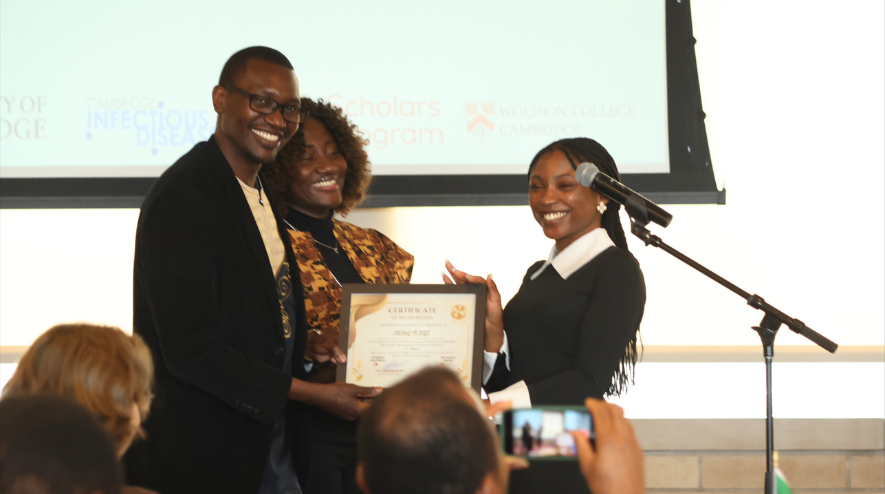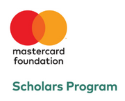
Submitted by Favour Peters on Fri, 09/05/2025 - 09:25
Hosted by the Josef Korbel School of International Studies at the University of Denver, the annual Sustainable Development in Africa Conference explores the multifaceted challenges facing the African continent and proposes contextual solutions for sustainable development.
Against the backdrop of a changing global order – marked by new leadership in the United States and evolving international relations – the conference invited participants to examine Africa’s position in this uncertain landscape. This year’s theme, 'Africanism at Crossroads: Confronting Security, Economic, and Climate Crises', focused on the intersection of climate change with human health security, environmental pressures, and political instability, including dialogues on Africa’s future amidst ongoing leadership crises and military coups.
My research; 'Climate Change, Zoonotic Spillover, and Human Health Security in Africa: Are We Prepared for the Next Pandemic?' was selected among the top five for presentation at the conference out of 20 papers submitted. I spoke on the role of climate change in emerging infectious diseases, the pathways of zoonotic spillover, and the urgent need for climate-resilient health systems and cross-border surveillance efforts. As I see it, as the world confronts an era of global environmental shifts, building robust public health preparedness in the African region is no longer optional but a crucial strategy to mitigate future pandemics.
Favour giving her presentation at the Josef Korbel School of International Studies. Credit: Students For Africa | University of Denver
Submissions to the 2025 Sustainable Development in Africa Conference were evaluated by a jury of academics that required applicants to submit papers that demonstrated writing competence, clarity and organisation, as well as the depth and quality of research and analysis. Following a rigorous evaluation of live presentations on the day, I was delighted to be announced and awarded first place overall for the outstanding originality, clarity, and thoughtful analysis in my paper.
This was my first time in the United States – something I had dreamed about for a long time. When I received the invitation to attend this conference, through the John A. Kufuor Foundation & Kufuor Scholars Program, I was so thrilled. Travelling there and speaking among esteemed professionals and academics in various disciplines from international development to public health at the University of Denver felt so surreal. Like that wasn’t enough, being awarded first place and recognised for the outstanding paper presentation at such a conference felt like an out-of-this-world experience. I was speechless and overwhelmingly surprised.
As a young woman from a small suburb in the mountains of Aburi, Ghana, this once seemed like a far-fetched imagination. But here I was presenting my research on an international platform! It was both a humbling and empowering experience.
Favour receiving first place award from Students For Africa Faculty Advisor Prof Singumbe Muyeba and President Akosua Otiwaa Ampofo. Credit: Students For Africa | University of Denver
In addition to presenting my paper, I also participated in a panel discussion on the impact of climate change on human health and economic sovereignty in Africa in light of current shifts in global health financing. I emphasised the importance of building climate-resilient health systems and promoting regional self-reliance to strengthen the continent’s capacity to respond to emerging crises in a rapidly changing world.
If Africa is to withstand the next wave of a global health crisis, we must move beyond dependency and begin to design systems that reflect our contexts, strengths and realities. Climate change is not just an environmental issue – it is a public health emergency, and our response must be bold and rooted in local leadership.
Favour participating in the Q&A session after her presentation. Photo Credit: Students For Africa | University of Denver
I’m incredibly proud to have represented the University of Cambridge and the Mastercard Foundation Scholars Program at this conference. It was not only an academic milestone for me, but a deeply personal moment of affirmation. Now, I am applying knowledge I’ve gained in my MPhil in Population Health Sciences to meaningful platforms like these. The programme’s community, mentorship, and belief in the potential of young African changemakers has been instrumental in shaping my career and personal growth.
Looking ahead, I want to play my part in advancing zoonoses and one health research towards building climate-resilient health systems in Africa. I encourage future Mastercard Foundation Scholars to embrace global opportunities to not only share their work, but to take their place in shaping the future of sustainable international development.




